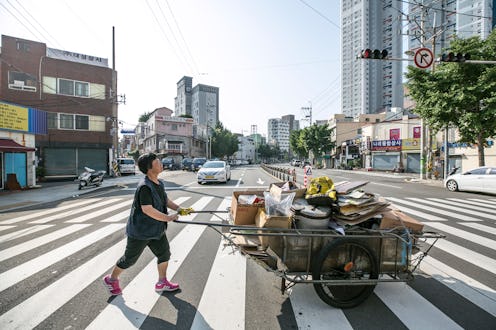
Recycling is an easy way to cut down on waste, limit your environmental impact, and even fight climate change, since the process reduces the amount of planet-warming greenhouse gases released into the atmosphere. However, some communities don't provide recycling services — and this can be frustrating for people who try to be eco-conscious consumers. If your city doesn't recycle, there are thankfully several solutions, so you can do your part to help the planet.
As the New York Times reported in March, as the cost of recycling rises, hundreds of towns and cities across the United States have canceled or greatly reduced the services offered by their recycling programs. Two of these cities include Franklin, New Hampshire, and Deltona, Florida, which cancelled their programs in 2018 and 2019, respectively.
If you live in a place that doesn't offer these services, the most direct way to participate in recycling is to take your recyclable items to an independent recycling center or business that accepts outside recyclables. The website Earth 911 has a recycling search tool where you can enter your zip code to find a list of places near you that will accept recycling. In addition to providing location information, the tool also lists the types of recyclable materials that each organization or business will accept from the public. Notably, if you have a lot of one type of material (for example, plastic bottles), you can also organize your search by material to see which organization closest to you accepts your specific item.
If independent recycling your items doesn't work for you, thinking a little bit more about what you purchase is another good option. For example, you can limit the amount of packaged food products you buy and also start composting food waste. Moreover, consider using online resale and donation websites, like groups on Facebook or Craigslist, to get rid of household items such as plastic storage containers, mason jars, and cardboard moving boxes that you no longer need.
Of course, one of the most effective ways to be an eco-conscious consumer is to reduce your overall waste, especially since many recyclable products are frequently rejected by recycling companies, Business Insider reported. This list from Small Footprint Family offers some great tips for how to start reducing your waste at home.
Finally, in addition to being proactive about your own recycling, you can work to lobby your city's officials to encourage them to start a recycling program. USA.gov has a handy local government portal to help guide your search for local politicians' contact information. Once you have this info, you can reach out to your representative to express support for a local recycling program. And if your city doesn't have funding or support for a comprehensive recycling program, remember that you can push officials to pass less costly waste reduction initiatives, like plastic bag bans.
As you can see, there are lots of ways for you to help recycle in your city, even if it doesn't have an official program yet. In fact, research from the Environmental Protection Agency indicates that waste prevention and recycling are two of the very best ways to cut greenhouse gas emissions. For example, the agency emphasizes that if, for one year, 2,000 workers in an office building recycled all applicable waste, they would reduce greenhouse gas emissions by 440 MTCE (Metric Tons of Carbon Equivalent). This is equivalent to taking around 330 cars off of the road, the agency says. Individual action doesn't just make a difference — it's crucial to curbing climate change.
This story is part of Covering Climate Now, a global collaboration of more than 250 news outlets to strengthen coverage of the climate story.